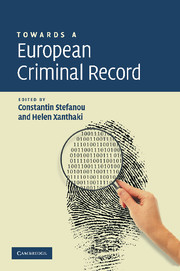Book contents
- Frontmatter
- Contents
- List of contributors
- Preface and acknowledgements
- 1 Introduction: How did the idea of a European Criminal Record come about?
- PART I
- 2 The European Criminal Record: Analysis
- 3 The European Criminal Record: Political parameters
- 4 The establishment of a European Criminal Record: Human rights considerations
- PART II
- PART III
- 19 Conclusions
- Index
4 - The establishment of a European Criminal Record: Human rights considerations
Published online by Cambridge University Press: 13 July 2009
- Frontmatter
- Contents
- List of contributors
- Preface and acknowledgements
- 1 Introduction: How did the idea of a European Criminal Record come about?
- PART I
- 2 The European Criminal Record: Analysis
- 3 The European Criminal Record: Political parameters
- 4 The establishment of a European Criminal Record: Human rights considerations
- PART II
- PART III
- 19 Conclusions
- Index
Summary
Introduction
The previous chapters elaborated on the problems that exist in the current system of exchange of information among Member States regarding criminal convictions. They highlighted the inadequacies in current processes and touched upon the lack of harmonisation of criminal records within the EU. These gaps become more striking, when one considers that knowledge of prior criminal activity would seriously contribute to the combating of transnational organised crime, a category flourishing in Europe. Therefore, changes in the current system appear necessary; such changes should include, the authors of this book propose, the establishment of a European Criminal Record. This chapter assesses the possible compliance of the European Criminal Record (ECR) with human rights standards and identifies the specific conditions that have to be fulfilled so that such compliance is achieved. The chapter analyses the relevant European human rights standards, as codified by the Council of Europe bodies and by the EU, and attempts to apply the principles incorporated therein to the ECR. There has not been specific jurisprudence on criminal records; however, analogies with other measures to prevent crime can be drawn, even though important differences exist between them in the nature and level of interference.
General legal framework
The European Convention on Human Rights
The right to privacy has long been established in Article 8 of the European Convention on Human Rights (ECHR), the main human rights binding instrument of the EU as confirmed by Article 268 of the Treaty of Amsterdam.
- Type
- Chapter
- Information
- Towards a European Criminal Record , pp. 79 - 104Publisher: Cambridge University PressPrint publication year: 2008



